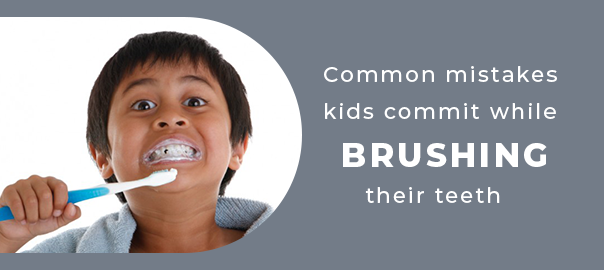
Common Mistakes children make while Brushing their teeth
As parents, we understand that we must instill good oral hygiene practices in our children from a very young age. Of course, this includes brushing their teeth. Yet, with all our emphasis and efforts, there remain some common mistakes that children make when brushing their teeth. In this blog post, we will look at some of these common pitfalls in the hope of guiding you to be able to correct them effectively.
Time of brushing:
One of the most common mistakes children make is not spending sufficient time while brushing their teeth. Kids generally hurry through the routine of brushing, mostly to be able to move on to other interesting activities. However, experts in dentistry advise that a child must spend a minimum of two minutes to brush his teeth properly with a children’s toothbrush. Parents could add a little fun in the brushing time, perhaps by setting a timer or playing a favorite song to make it fun and maybe easier for the child to stay committed during the process.
Technique of Brushing:
The other common mistake is wrong technique in brushing. Kids generally tend to scrape hard or forget areas in their mouth, and therefore clean them improperly. Parents should demonstrate the correct technique for their children in a gentle circle motion and angle the children’s toothbrush towards the gum line. They should be supervised in the beginning so that even if any mistake is made, it could be corrected, and they will learn good habits.
Which Toothpaste to Use:
Sourcing the proper toothpaste is part of good oral care. While the flavor is such that some children like the taste, which attracts their taste perception, the parent will want to consider fluoride because it helps prevent tooth decay. Professional advice from a pediatric dentist can help you find the balance between flavor preference and dental health, guiding you toward the right toothpaste for your child. Fluoride-free toothpaste is the best toothpaste for cavities and can be used for smaller children.
When to Change the Toothbrush:
Children hardly ever recall when a toothbrush was last replaced. The bristles progressively become frayed, and hence less effective in picking up dental plaque than when new. One of the most significant mistakes one might make is to continue using a toothbrush that is old and, in so doing, compromise oral hygiene. Parents should establish a mechanism for replacing toothbrushes after every three to four months or earlier if bristles appear frayed.
Overuse of Toothpaste:
Surprisingly, even with something as important to a child’s natural health like toothpaste, most children have always used too much. In fact, a pea-sized amount of toothpaste is suggested by oral health professionals to avoid potential fluorosis risks, associated with overexposure to fluoride. Help teach your child the proper amount, and monitor so they aren’t “helping” themselves to any more than they need.
Conclusion:
Remember in this tender age, it is when you are inculcating the right habit of oral hygiene, which will see your child through with healthy teeth and gums throughout their lifetime. The best oral health habits must be inculcated in a child by their parents, such as correcting common mistakes including the time, technique of brushing, choice of toothpaste, replacement of a toothbrush, and overuse of toothpaste. Making oral care enjoyable and educational will give children the correct habits in adulthood.
Leave a Reply
Leave a Reply
Explore More Similar Posts
Explore More Blogs


Leave a Reply